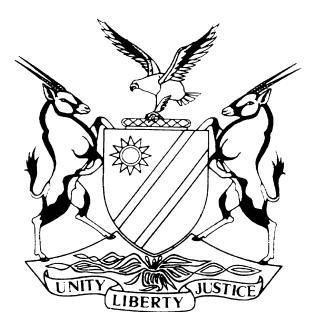 REPUBLIC OF NAMIBIA
REPUBLIC OF NAMIBIA

HIGH COURT OF NAMIBIA, MAIN DIVISION, WINDHOEK
RULING ON APPLICATION FOR POSTPONEMENT
Case no: HC-MD-CIV-ACT-DEL-2016/02394
In the matter between:
KARSLRUH NUMBER ONE FARMING CLOSE CORPORATION 1st PLAINTIFF
NABIL BENANI 2nd PLAINTIFF
MOHAMED BOUDOUNI 3rd PLAINTIFF
and
DE WET ESTERHUIZEN 1st DEFENDANT
QUINTON KEYS 2nd DEFENDANT
Neutral Citation: Karslruh Number One Farming Close Corporation vs De wet Esterhuizen (HC-MD-CIV-ACT-DEL-2016/02394) [2018] NAHCMD 139 (23 May 2018)
CORAM: PRINSLOO J
Heard: 14 May 2018
Delivered: 15 May 2018
Reasons: 23 May 2018
ORDER
1. Application for postponement is granted.
2. Applicant to pay wasted costs occasioned by the postponement.
Further conduct of the matter:
3. The case is postponed to 21/05/2018 at 08:30 for Status hearing (Reason: Hearing Dates (Assign).
_____________________________________________________________________________________
RULING IN TERMS OF PD 61 OF THE PRACTICE DIRECTIVES
_____________________________________________________________________________________
Prinsloo J:
[1] The matter before me has been set down for hearing for the week of 14 to 18 May 2018.
[2] At the onset of the proceedings, the first defendant (applicant) brought an application for postponement of the matter.
[3] The locus classicus that regulates applications for postponement is the matter of Myburgh Transport v Botha t/a SA Truck Bodies 1991 NR 170 (SC) wherein the Supreme Court set out the legal principles when considering an appeal against a refusal to grant a postponement. The principles relevant for purposes of this case are:
‘1. The trial Judge has a discretion as to whether an application for a postponement should be granted or refused (R v Zackey 1945 AD 505).
2. That discretion must be exercised judicially. It should not be exercised capriciously or upon any wrong principle, but for substantial reasons. (R v Zackey (supra); Madnitsky v Rosenberg 1949 (2) SA 392 (A) at 398-9; Joshua v Joshua 1961 (1) SA 455 (GW) at 457D.)
. . . .
5. A Court should be slow to refuse a postponement where the true reason for a party's non-preparedness has been fully explained, where his unreadiness to proceed is not due to delaying tactics and where justice demands that he should have further time for the purpose of presenting his case. Madnitsky v Rosenberg (supra at 398-9).
. . . .
7. An application for postponement must always be bona fide and not used simply as a tactical manoeuvre for the purposes of obtaining an advantage to which the applicant is not legitimately entitled.
8. Considerations of prejudice will ordinarily constitute the dominant component of the total structure in terms of which the discretion of a Court will be exercised. What the Court has primarily to consider is whether any prejudice caused by a postponement to the adversary of the applicant for a postponement can fairly be compensated by an appropriate order of costs or any other ancillary mechanisms. (Herbstein and Van Winsen The Civil Practice of the Superior Courts in South Africa 3rd ed at 453.)
9. The Court should weigh the prejudice which will be caused to the respondent in such an application if the postponement is granted against the prejudice which will be caused to the applicant if it is not.
10. Where the applicant for a postponement has not made his application timeously, or is otherwise to blame with respect to the procedure which he has followed, but justice nevertheless justifies a postponement in the particular circumstances of a case, the Court in its discretion might allow the postponement but direct the applicant in a suitable case to pay the wasted costs of the respondent occasioned to such a respondent on the scale of attorney and client. Such an applicant might even be directed to pay the costs of his adversary before he is allowed to proceed with his action or defence in the action, as the case may be. Van Dyk v Conradie and Another 1963 (2) SA 413 (C) at 418; Tarry & Co Ltd v Matatiele Municipality 1965 (3) SA 131 (E) at 137.’
[4] The granting of a postponement is in the discretion of the court. What has crystalized during the years is the following:1
The applicant for postponement bears the onus. He must make out his case on the papers.
A postponement is not had for the asking.
An application for postponement must be brought as soon as the reason giving rise to it is known.
There must be a full and satisfactory explanation by the applicant seeking postponement of the reasons necessitating a postponement.’
[5] I am of the opinion that refusing the postponement would not do substantial justice between the parties and I will therefore grant the postponement prayed for.
[6] In the result, I then make the following order:
1. Application for postponement is granted.
2. Applicant to pay wasted costs occasioned by the postponement.
Further conduct of the matter:
3. The case is postponed to 21/05/2018 at 08:30 for Status hearing (Reason: Hearing Dates (Assign).
______________
JS Prinsloo
Judge
APPEARANCES:
FOR THE PLAINTIFF: E Shikongo
of Shikongo Law Chambers, Windhoek
FOR THE DEFENDANT: H Garbers – Kirsten
instructed by Francois Erasmus & Partners, Windhoek
1 Hailulu v Anti-Corruption Commission and Others 2011 (1) NR 363 (HC) at para 36.